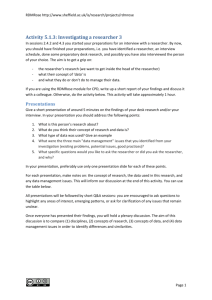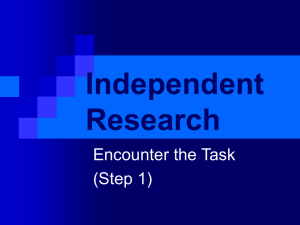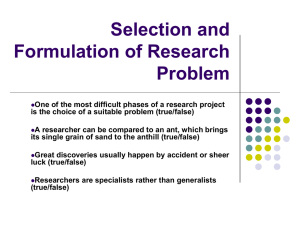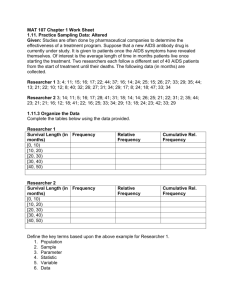Research project lifespan - recommended practice
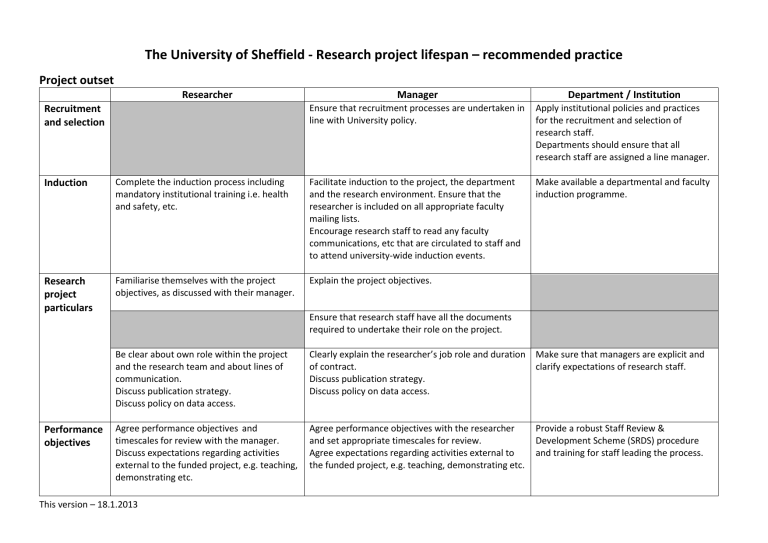
The University of Sheffield - Research project lifespan – recommended practice
Project outset
Recruitment and selection
Induction
Researcher
Complete the induction process including mandatory institutional training i.e. health and safety, etc.
Manager
Ensure that recruitment processes are undertaken in line with University policy.
Department / Institution
Apply institutional policies and practices for the recruitment and selection of research staff.
Departments should ensure that all research staff are assigned a line manager.
Make available a departmental and faculty induction programme.
Facilitate induction to the project, the department and the research environment. Ensure that the researcher is included on all appropriate faculty mailing lists.
Encourage research staff to read any faculty communications, etc that are circulated to staff and to attend university-wide induction events.
Explain the project objectives. Research project particulars
Familiarise themselves with the project objectives, as discussed with their manager.
Performance objectives
Be clear about own role within the project and the research team and about lines of communication.
Discuss publication strategy.
Discuss policy on data access.
Agree performance objectives and timescales for review with the manager.
Discuss expectations regarding activities external to the funded project, e.g. teaching, demonstrating etc.
This version – 18.1.2013
Ensure that research staff have all the documents required to undertake their role on the project.
Clearly explain the researcher’s job role and duration of contract.
Discuss publication strategy.
Discuss policy on data access.
Make sure that managers are explicit and clarify expectations of research staff.
Agree performance objectives with the researcher and set appropriate timescales for review.
Agree expectations regarding activities external to the funded project, e.g. teaching, demonstrating etc.
Provide a robust Staff Review &
Development Scheme (SRDS) procedure and training for staff leading the process.
Personal and career development
Researcher
Engage in skills training and career development activities as appropriate.
For example, devise a personal development plan and maintain a log of development undertaken. Work with manager to identify essential job-related training.
Project mid-point
Research
Project
Researcher
Undertake research as directed by manager or by the person responsible for the day-today running of the project.
Contribute to review meetings and undertake any agreed actions.
Raise any project-related issues with manager.
Integration Identify opportunities to engage with research staff in the department and the
University’s wider research community, as appropriate to the responsibilities of the
Personal development researcher in relation to the research project.
Identify development needs and discuss with manager and / or mentor.
Consider maintaining a personal development log.
Identify and undertake relevant personal and career development opportunities.
Manager
Discuss the researcher’s opportunities to participate in skills training and career development activities.
Facilitate any essential job-related training.
Manager
Run regular project review meetings (to be held by manager or by the person responsible for the dayto-day running of the project).
Monitor project progress and adjust plans and goals accordingly.
Encourage research staff to engage with colleagues at departmental level and across the institution, as appropriate to the responsibilities of the researcher in relation to the research project.
Department / Institution
Provide appropriate support mechanisms, e.g. a mentor or buddy, as appropriate.
Department / Institution
Have an overview of the project through review meetings with manager.
Establish an infrastructure that enables research staff to be integrated into a department’s activities and to engage with the wider University research community, as appropriate.
Have regular meetings with the researcher to discuss personal and career goals and signpost to appropriate support.
Encourage the researcher to access training and development opportunities aligned to career planning, e.g. through mentoring, use of careers service, etc.
Provide research staff with appropriate training and development opportunities and access to specialist support aligned to career planning.
Ensure these opportunities are robust and informed by labour market information.
Ensure that these are communicated effectively to all researchers.
This version – 18.1.2013
Career development
Researcher
Maximise opportunities for building publishing profile.
Be prepared to take on supervision, teaching duties, knowledge exchange activities and innovation opportunities, as appropriate.
Begin to look for future funding opportunities such as fellowships and research grants, if appropriate.
Performance review including
SRDS
Participate in performance review meetings.
Prepare for SRDS objective setting and review meetings and fulfil the agreed objectives.
Manager
Encourage and support the researcher in developing the skills that they will need to be both effective researchers and highly-skilled professionals in whatever field they choose to enter.
Enable the researcher to access opportunities to develop independent research skills, e.g. writing publications, presenting at conferences and seminars, etc.
Enable access opportunities to undertake supervision and/or teaching duties as appropriate.
Encourage researcher to develop publications throughout the project.
Provide researcher with opportunities for knowledge exchange and innovation, as appropriate.
Encourage members of research staff to apply for
Fellowships.
Where opportunities exist, include postdocs on grant applications, e.g. as a named Co-I, if possible.
Ensure that regular review meetings take place in order to monitor the researcher’s performance and progress against objectives.
Explain purpose of SRDS and the process.
Enable SRDS discussions for research staff to take place
Undertake own SRDS discussion as a reviewee.
Department / Institution
Encourage PI’s to have career development discussions with researchers and support a variety of career development methods including presentation, project and people management opportunities.
Encourage managers to hold regular performance review meetings with research staff.
Ensure that all staff have an annual SRDS meeting.
Encourage SRDS reviewers to attend reviewer training and to keep their knowledge of the process up to date.
This version – 18.1.2013
Project conclusion
End of project procedures
Future career options
Researcher
Discuss options for ongoing employment with manager.
Engage with the University’s end of contract processes for redeployment or redundancy, if appropriate.
Consider future career options and access career planning support, if appropriate.
End of project review
After the end of the project
Ensure that all assigned work for the project can be finished by the completion date, in negotiation with the manager.
If circumstances change, a discussion needs to take place on how the loose ends of the project will be tied up.
Contribute to planning the continuation and/or finalisation of the project as appropriate.
Manager
Discuss options for ongoing employment and/or redeployment options with the researcher in advance of the project completion date.
Ensure the researcher understands the University’s end of contract processes for redeployment and redundancy.
Encourage the researcher to access career planning support if required.
Discuss with the researcher future career options.
Assist the researcher to find alternative employment or funding opportunities, as appropriate.
Continue to encourage and support the researcher to write papers and/or give presentations from the project.
Arrange an end of project review meeting with the researcher that allows time to discuss outcomes, achievements and possible next steps.
Ensure that the researcher’s contribution is appropriately acknowledged in all documentation about the project and in publications and presentations arising from the project.
Department / Institution
Ensure that departments are aware of the end date of contracts for research staff.
Ensure that the departments are familiar with and adhere to the University’s process for redeployment and redundancy.
Ensure that information on support with career planning is distributed to research staff.
Ensure that end of project reports / monitoring forms are completed in line with funders’ requirements.
This version – 18.1.2013
The University of Sheffield - useful reference documents / HR policies
The University of Sheffield links
University Health & Wellbeing policies - http://www.shef.ac.uk/hr/wellbeing/info/index
University policy on Work Life Balance - http://www.shef.ac.uk/hr/guidance/worklifebalance/wlbpolicy
Sheffield University and College Union - http://ucu.group.shef.ac.uk/
Staff & Leadership Development - http://www.sheffield.ac.uk/hr/sld
Staff Review & Development Scheme (SRDS) - http://www.shef.ac.uk/hr/guidance/srds
Training on Staff Review and Development Scheme (SRDS) -
http://www.sheffield.ac.uk/hr/sld/developyourself/srds
Training for research staff - http://www.sheffield.ac.uk/ris/pgr-support/rsd
Promotions processes - http://www.shef.ac.uk/hr/reward/promotion
Good Research and Innovation Practices (GRIP) - http://www.shef.ac.uk/ris/other/gov-ethics/grippolicy
Information on research data, authorship and publication:
http://www.shef.ac.uk/ris/other/gov-ethics/grippolicy/practices/all
Human Resources - http://www.shef.ac.uk/hr
Research Finance - http://www.sheffield.ac.uk/finance/staff-information/help/research_finance/index
Recruitment and selection guidance - http://www.sheffield.ac.uk/hr/recruitment/guidance
Induction - www.sheffield.ac.uk/hr/recruitment/guidance/induction
Equality & Diversity Policies, Guidance and Information - http://www.shef.ac.uk/hr/equality/policies-index
Contracts of employment – http://www.shef.ac.uk/hr/guidance/contracts
Research Staff Development - http://www.shef.ac.uk/ris/pgr-support/rsd/traininganddevelopment/index
Redeployment - http://www.shef.ac.uk/hr/guidance/leaving/redeployment/policy
Post-doc societies
Engineering Researcher Society - http://www.shef.ac.uk/faculty/engineering/staff/ers
BMS Postdoctoral Society - http://www.sheffield.ac.uk/bms/staff/postdocs
MBB Postdoctoral Society - http://www.shef.ac.uk/mbb-postdoc/home
Research Councils UK (RCUK)
- http://www.rcuk.ac.uk/pages/home.aspx
RCUK Funding Bodies:
Arts & Humanities Research Council (AHRC) – www.ahrc.ac.uk
Biotechnology and Biological Sciences Research Council (BBSRC) - www.bbsrc.ac.uk
Engineering and Physical Sciences Research Council (EPSRC) – www.epsrc.ac.uk
Economic and Social Research Council (ESRC) – www.esrc.ac.uk
Medical Research Council (MRC) – www.mrc.ac.uk
Natural Environment Research Council (NERC) – www.nerc.ac.uk
Science and Technology Facilities Council (STFC) – www.stfc.ac.uk
Funders’ publication policies - http://www.shef.ac.uk/library/services/funders
This version – 18.1.2013
RCUK Concordat
A Concordat to Support the Career Development of Researchers was launched by the Government in
2008 in response to the Roberts’ Review. This has the support of Universities UK, and Research Councils
UK and the University of Sheffield subscribes to uphold the Concordat principles. The Concordat sets out
7 guiding principles including the recognition of a researcher’s personal career development (Principle 4) and a researcher’s shared responsibility (with managers) to engage with their own career development
(Principle 5). http://www.vitae.ac.uk/CMS/files/upload/Vitae-Concordat-2011.pdf
HR Excellence in Research Award
The University has gained the European Commission’s HR Excellence in Research Award. The award publicly signals this University's commitment to research staff on fixed-term research contracts and to further improving the environment for them, and acknowledges the University's alignment with the principles of the 'European Charter for Researchers and the Code of Conduct for their Recruitment' (the
'UK Concordat to Support the Career Development of Researchers'). The University award commits the
University to implementing an action plan, which is published on the R&I Services website at: http://www.sheffield.ac.uk/ris/pgr-support/rsd/hrexcellence
Vitae
Vitae is the national organisation which champions the personal, professional and career development of doctoral researchers and research staff in higher education institutions and research institutes.
Further information is available at http://www.vitae.ac.uk/.
Vitae Researcher Development Framework - http://www.vitae.ac.uk/researchers/429351/Introducingthe-Researcher-Development-Framework.html
UK Research Staff Association (UKRSA) - http://www.vitae.ac.uk/researchers/205761/UK-Research-
Staff-Association.html
Eurodoc (The European Council of Doctoral Candidates and Junior Researchers) – http://www.eurodoc.net/
This version – 18.1.2013

